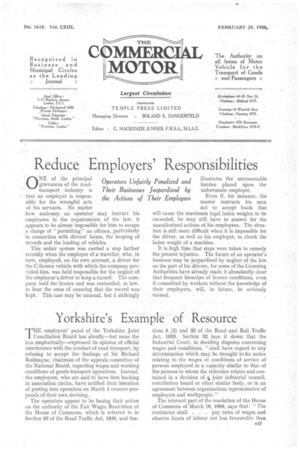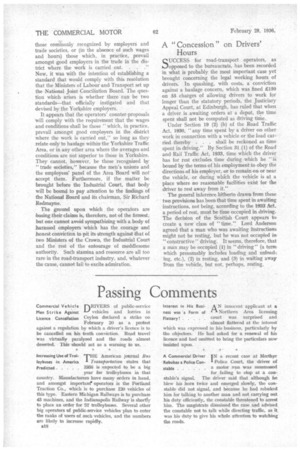Yorkshire's Example of Resource
Page 31

Page 32

If you've noticed an error in this article please click here to report it so we can fix it.
THE employers' panel: of the Yorkshire Joint Conciliation Board has silently—but none the less emphatically--expressed its opinion of official interference vrith'the cdriduct of road transport, by refusing to accept the findings of Sir Richard Redniayne, chairman of the appeals committee of the National Boatd, regarding wages and working conditions of goods-transport operatives. Instead, the employers, who are said to have firm backing in 'association circles, have notified their intention of putting into operation on March 1 counter-proposals of their own devising.
The operators appear to be basing their action on the authority of the Fair Wages Resolution of the House. of Commoms, which is referred to in Section 93 of the Road Traffic Act, 1930, and Sec tions 8 ,(2) and 32 of, the Road and, Rail Traffic :Act, • 1933. Section 32. lays it down I that the Industrial Court, in deciding disputes concerning wages and conditions, "shall have regard to any determination Which may be brought to Ls notice relating to the wages or conditions of service of persons employed in a capacity similar to that of the persons to whom the reference relates and contamed in a decision Of 4, joint industrial council, conciliation, board or other, similar body, or in an agreement between organizations representative of employers and workpeopte."
The relevant part of the resolution of the House of Commons of March 10, 1909, says that : "The Contractor shall . . . pay rates of wages and observe hours of labour not less favourable than those cominonly recognized by employers and trade societies, or (in the absence. of such wages and hours) those which, in practice, prevail amongst good employers in the trade in the district where the work is carried out. . . ." Now, it was with the intention of establishing a standard that would comply with this resolution that the Ministers of Labour and Transport set up the National Joint Conciliation Board. The question which arises is whether there can be two standards—that officially instigated and that devised by the Yorkshire employers.
It appears that the operators' counter-proposals will comply with the requirement that the wages and conditions shall be those "which, in practice, prevail amongst good employers in the district where the work is carried out," so long as they relate only to haulage within the Yorkshire Traffic Area, or in any other area where the averages and conditions are not superior to those in Yorkshire. They cannot, however, be those recognized by "trade societies," because the men's unions and the employees' panel of the Area Board will not' accept them. Furthermore, if the matter be brought before the Industrial Court, that body will be bound to pay attention to the findings of the National Board and its chairman, Sir Richard Redmayne.
The ground upon which the operators are basing their claims is, therefore, not of the firmest, but one cannot avoid sympathizing with a body of harassed employers which has the courage and honest -conviction to pit its strength against that of two Ministers of the Crown, the Industrial Court and the rest of the entourage of meddlesome authority. Such stamina and resource are all too rare in the road-transport industry, and, whatever the cause, cannot fail to excite admiration. A "Concession" on Drivers' Hours CUCCESS for road-transport operators, as opposed to the bureaucrats, has been recorded in what is probably the most important case yet brought concerning the legal working hours of drivers. In quashing, with costs, a conviction against a haulage concern, which was fined £150 on 55 charges of allowing drivers to work for longer than the statutory periods, the Justiciary Appeal Court, at Edinburgh, has ruled that when a driver is awaiting orders at a depot, the time spent shall not be computed as driving time. Under Section 19 (2) (b) of the Road Traffic Act, 1930, "any time spent by a driver on other work in connection with a vehicle or the load carried thereby . . . shall be reckoned as time spent in driving." By Section 31(1) of the Road and Rail Traffic Act, 1933, time which the driver has for rest excludes time during which he " is. bound by the terms of his employment to obey the directions of his employer, or to remain on or near the vehicle, or during which the vehicle is at a place where no reasonable facilities exist for the driver to rest away from it."
The general inference hitherto drawn. from these two provisions has been. that time spent in awaiting instructions, not being, according to the 1933 Act, a period of rest, must be time occupied in driving. The decision of the Scottish Court appears to create a new class of " time." Lord Anderson agreed that a man who was awaiting instructions might not be resting, but he was not occupied in " constructive" driving. It seems, therefore, that a man may be occupied (1) in "driving" (a term which presumably includes loading and unloadl ing, etc.), (2) in resting, and (3) in waiting away from the vehicle, but not, perhaps, resting.




























































































